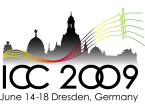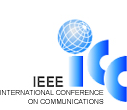Executive Commitee
General Chairs
Dr. Russell Hsing
Telcordia Tech., USA
General Vice Chairs
Prof. C.K. Toh
University of Hong Kong
Hong Kong
Dr. Daniel Wong
Daniel Wireless LLC
USA
TPC Chair
Prof. Chung-Ming Huang
National Cheng Kung Univ. Taiwan
TPC Vice Chairs
Prof. Pietro Manzoni
Universidad Politecnica De Valencia
Spain
Prof. George Carle
Muenchen Technical Univ.
Germany
Important Dates
Paper Submission Deadline:
extended to November 15, 2008
Notification of Acceptance:
January 15, 2009
Camera-Ready Submissions:
March 1, 2009
Workshop celebration date:
Sunday, 14 June 2009
All authors must register until latest 27 Feb 2009. >> read more...
For further information on the registration with ICC 2009 check here.
We are looking forward to seeing you in Dresden!
|
Aims and Scope
Car-to-car (C2C) communication networks, and more generally, Vehicle Infrastructure Integration (VII) have now gained popularity and importance. New technical challenges have evolved that demand research and investigations. Technologies and applications for VII are rapidly emerging, and there is an urgent need to bring together researchers & engineers, academia and industry, standards, private and public sectors, to exchange ideas.
This 1-day workshop is intended to serve as a forum and bring together the researchers and engineers in both academia and industry to exchange ideas, share experiences, and report original works about all aspects of service discovery and composition in ubiquitous and pervasive environments. The main purpose is to promote discussions of research and relevant activities in the design of architectures, algorithms, and applications for inter-vehicular communication environments. This workshop will also address some leading standardization efforts (802.11p, IEEE p1609, TIA TR48, etc.). Work in progress is also welcome.
Accepted Papers
- Wireless Media Streaming in IP-based In-Vehicle Networks, Mehrnoush Rahmani; Martin Pfannenstein
- A Novel Localized Data Aggregation Algorithm for Advanced Vehicular Traffic Information Systems, Kaveh Shafiee; Victor Leung
- A Probabilistic Protocol for Multi-Hop Routing in VANETs, Junichiro Fukuyama
- Position-based data traffic prioritization in safety-critical vehicle-to-infrastructure communication, Annette Bohm; Magnus Jonsson
- Supporting Safety Driving with Inter-Vehicle CDMA Networks under Realistic Accident Scenarios, Hiroyuki Yomo; Michio Miyamoto; Oyunchimeg Shagdar; Takashi Ohyama; Mehdad Shirazi; Ryu Miura; Sadao Obana
- The Effect of VII Market Penetration on Safety and Efficiency of Transportation Networks, Mohammad Nekoui; Hossein Pishro-Nik
- CAR-2-X Communication SDK - A Software Toolkit for Rapid Application Development and Experimentations, Andreas Festag; Roberto Baldessari; Long Le; Wenhui Zhang
- Study of beaconing for car-to-car communication in vehicular ad-hoc networks, Alexey Vinel; Dirk Staehle; Andrey Turlikov
- A WAVE-compliant MAC Protocol to Support Vehicle-to-Infrastructure Non-Safety Applications, Marica Amadeo; Claudia Campolo; Antonella Molinaro; Giuseppe Ruggeri
- Automated Ride Share Selection using Vehicular Area Networks, Amrinder Arora; Mira Yun; Timothy Kim; Yu Zhou; Hyeong-Ah Choi
PANEL SESSION: "The Challenges of VANETS: how to evaluate the validity of new research proposals"
Speakers:
- Andreas Festag (NEC Laboratories Europe - Germany)
- Jose Manuel Barrios (Applus+ IDIADA - Spain)
- Hannes Hartenstein (Universität Karlsruhe - Germany)
Vehicular Ad-Hoc Network (VANET) related research is oriented towards the development of solutions to provide communication support for future Intelligent Transportation Systems (ITS). One key objective of VANET is to enable rapid and cost-efficient dissemination of information to increase safety and comfort of drivers and passengers. Evaluating and testing new research approaches is a crucial task, and simulation is widely used as a first step in new protocol development for VANETs. In this panel, we compare different views given by representatives from industry and the academia. We discuss and assess which tools, methodologies and procedures are appropriate for evaluation of VANET approaches.
|
List of Topics
Technical research papers are solicited in the following areas:
- Network technologies for VII
- New application scenarios of VII
- Supporting technology for: Traffic and flow control issues and applications
- Supporting technology for: Enhanced braking information dissemination and other road safety applications
- Supporting technology for: driver assistance applications
- MAC, routing, QoS, addressing, multicast, TCP protocols
- Congestion Control and Cooperative VANETs
- Mobility and handoff issues
- Sensors & Data Collection
- Content Distribution
- Inter-car communications
- Intra-car communications
- Info Dissemination; Data organization
- Security issues, architectures and solutions
- Privacy issues and solutions
- Data replication protocols in network partitions
- Different technologies (DSRC, WiMAX, WiFi, 3G/4G, cell phone)
- Application innovation
- 802.11p WAVE ; 802.11s MESH; DSRC
- Implementation/deployment status
- Network Management for VII
Workshop web page
http://www.grc.upv.es/vehimobi2009
Technical Program Committee Members
Dr. Marc Necker, University of Stuttgart, GERMANY
Dr. Marco Fiore, Politecnico di Torino, ITALY
Dr. Onur Altintas, TOYOTA ITC, JAPAN
Dr. Jarek Rykowski, Poznan University of Economics, POLAND
Dr. Chungmin Chen, Telcordia Applied Research Center in Taiwan (TARC-TW), TAIWAN
Prof. Li-Der Chou, National Central University, TAIWAN
Prof. Kun-chan Lan, National Cheng Kung University, TAIWAN
|

